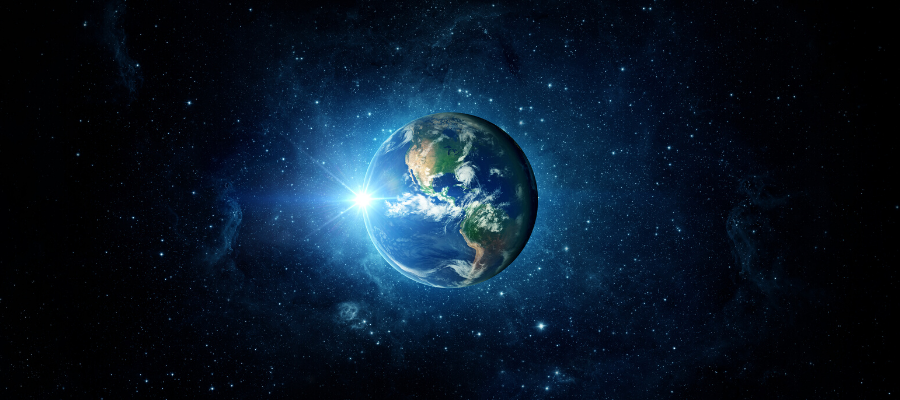The Big Bang - Before and After
Aug 14, 2016The Big Bang theory is the prevailing theory about the “birth” of the universe. It posits a singularity, or super high density state fr...

Throughout human history, every time we think we know what the universe is, it turns out that there is not just one of those things, but a lot of them.
First we thought the universe was Earth, a sun and a moon, and a sky with a lot of mysterious points of lights. Then there turned out to be a number of planets with their own moons. Then a lot of suns, with their own planets: a lot of solar systems.
For a while the universe was what we now call our galaxy. And then, it was a number of galaxies. Maybe five. Maybe five hundred. Maybe five million. However many galaxies we think, at any given time, make up the universe, it turns out that there are a million times more!
If our universe is our planet, plus everything we can see from here with our most powerful telescopes, then there are zillions of similar universes that are not our universe. Hence a multiverse. In that sense, at least, we live in a multiverse.
But now physicists are telling us, or at least asking us to consider, that we live in a multiverse of a much different sort.
All the galaxies we have just been talking about obey the same physics; the same basic laws, and the same constant values, like the speed of light. But what is called a “type 2” multiverse consists of universes where the fundamental constants have different values. Maybe e=mc3. Maybe light moves at the speed of molasses. It’s not just more of the same sorts of galaxies. It’s bunch of alternative universes, that work in different ways.
Why in the world—or perhaps why in the multiverse—would anyone believe that? There are different reasons. One goes like this: The values of the fundamental constants that emerged from the Big Bang were such as to allow for the formation of planets, without which there would have been no life, and no humans. That seems like that was a piece of luck.
But if you suppose that there were zillions of universes, with different values for the fundamental constants, it wouldn’t be a matter of luck, but of statistics. Given enough universes, the odds are that there is sure to be one was that is hospitable to human life. We couldn’t very well say it was luck that we live in one of them, because where else would we live?
One universe, hospitable for human life—call it luck. Or maybe intelligent design. But physicists don’t like luck, or depending on a benevolent God. With enough universes, a hospitable one is an inevitability.
That’s some argument. I’m afraid it doesn’t move me much. Between Intelligent Design and a type-2 multiverse, I’d go for Intelligent Design. I’d pick luck over either of them. But maybe I am missing something.
Comments (4)
Tim Smith
Thursday, August 1, 2019 -- 8:31 AM
How great is John Perry? IHow great is John Perry? I think very.
Hmm... if multiverses are mathematically/logically a reality well then let's talk about this. I'm not sure the maths are reality or if they are the only reality.
Physics/Applied Math has given us SpaceTime. We are prisoners on an island of knowledge and experience. String Theory has failed to materialize at the old LHC level of particle smashing. As I understand... and I don't very well perhaps... there's more to the multiverse than in supersymmetry. Is that right?
We can't seem to step out of intelligent design, can we? That, itself, is a philosophical reality.
Can we ever detect multiverses? That is worth thinking about. Surely it is a possible and interesting model.
dalecraft
Monday, April 8, 2024 -- 12:11 AM
As I know, the multiverseAs I know, the multiverse hypothesis arises from different cosmological and quantum theories. One prominent idea is the inflationary multiverse, which suggests that our universe is just one "bubble" among many in a larger "multiverse" where each bubble represents a separate universe with its own physical laws and properties. Another concept is the many-worlds interpretation of quantum mechanics, which proposes that every quantum event creates multiple branches of reality, resulting in a multitude of parallel universes where different outcomes of those events occur. While the multiverse remains a subject of ongoing scientific exploration and debate, it has captured the imagination of many writers, uno online, filmmakers, and storytellers. It often serves as a backdrop for narratives involving alternate realities, time travel, and the exploration of different possibilities.
Bover2004
Friday, November 1, 2024 -- 1:45 AM
The galaxy is like a block inThe galaxy is like a block in the universe, and the sun blasts: the universe, like human life, appears and fades away - all summed up in two words:Block Blast.
Ivango
Wednesday, March 5, 2025 -- 11:03 PM
Solar panels for parking lotsSolar parking lot solutions are transforming underutilized spaces into hubs of sustainable energy. These innovative systems combine practicality with eco-friendliness, offering shaded parking areas while generating clean electricity. Ideal for businesses, municipalities, and commercial properties, solar carports reduce energy costs, lower carbon footprints, and provide weather protection for vehicles.
By installing solar panels over parking spaces, organizations can maximize land use efficiency and enjoy long-term savings. Modern designs integrate seamlessly with existing structures, using durable materials that withstand harsh weather. Plus, these systems often qualify for tax incentives and rebates, making them a smart financial investment.
Ready to explore solar solutions for your parking lot? Discover high-quality commercial solar panels and expert guidance at A1SolarStore .